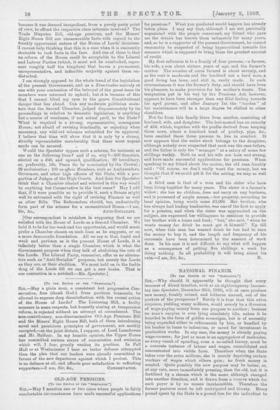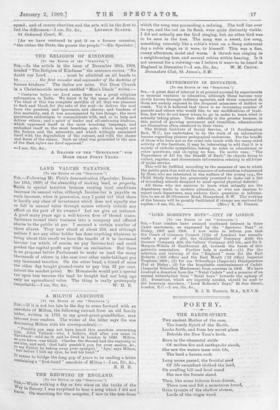NATIONAL FINANCE.
[To THE EDITOR OM THE "SpROTATOR:1 SIR,—Why should it apparently be thought that every increase of direct taxation, such as an eighteenpenuy Income- tax (see Spectator, December 26th, 1908), will at once produce new money, freshly coined, and hitherto unused, out of the pockets of the prosperous ? Surely it is true that this extra sixpence, yielding many millions, would merely be a diversion of wage-paying money front one purpose to another; because no man's surplus is ever lying absolutely idle, unless it be hoarded in the form of golden sovereigns, but is of necessity being expended either in refinements by him, or handled by his banker in loans to industries, or saved for investment in productive works. In any case, the money is already paying wage-earners; for just as mass is an aggregation of molecules, so every result of spending, even a so-called luxury, must be a concrete instance of labour and wages, consolidated and concentrated into visible form. Therefore when the State takes over the extra millions, she is merely depriving certain workers of wages which others gain ; no fresh money is created. Quite possibly the new purpose may be better, or, at any rate, more immediately pressing, than the old, but it is fertilised by a stream which is the same although changed into another direction, and is drawn from a reserve which for each payer is by no means inexhaustible. Therefore the former pastures must be left unirrigated and thirsty. Every pound spent by the State is a pound less for the individual to
spend; and of course charities-and the arts will he the, first to
feel the difference.—I am, Sir, &a., LNYESDN SCARTH. 84. Oakwood Court, W.
[As we have ventured to put it on a former occasion, "the richer the State, the poorer the people."—ED, Spectator.]













































 Previous page
Previous page